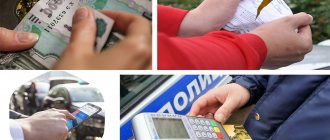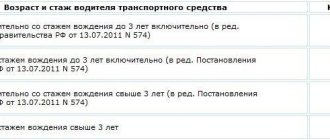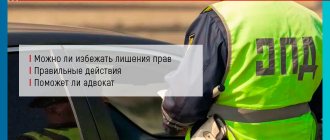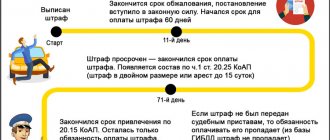Deprivation of rights for non-payment of fines is a temporary measure to prevent prolonged non-payment of debts over 10 thousand rubles.
Important!
There is no provision for confiscation of a driver's license.
According to the law, it is possible to suspend rights, or rather, to block them. And only if the defaulter has not paid all debts within 60 days from the date of legalization of the decision on the violation.
If the driver owes an amount less than 10 thousand, the bailiff does not have the right to prohibit him from using his driving license. Deprivation of a driver's license for non-payment of fines will be unlawful.
The legislative framework:
- Federal Law No. 340 dated November 28, 2015. Current since January 15, 2016.
Initially, the law contained inaccuracies that were corrected in order to avoid discrepancies and, as a result, unfair actions on the part of traffic police officers.
Let's consider all the nuances of the new legislation.
Ignoring fines and deprivation of rights
Failure to pay a fine is not yet a reason to take away a driver’s license. This remedy is provided only for persistent defaulters as a last resort. But there are certain concessions for them too.
The law on deprivation of driver's license does not apply to:
- violators whose debt is less than the specified figure, even if the amount is close to the specified amount;
- members of families in which the vehicle is the only source of income;
- defaulters - disabled people (grade 1 and 2) or their trustees, if they directly use the vehicle;
- citizens living in remote areas where it is impossible to communicate with the world without their own vehicle;
- holders of a resolution for a temporary deferment / installment plan for debt.
Note!
Thus, 60 days are given to pay the fine. Add another 10 to them for filing an appeal against the decision to block the VU.
Only after all the deadlines for voluntary payment of money for issued fines have expired, the driver can be deprived (temporarily!) of the right to drive.
Grounds for applying an administrative measure
- For unpaid child support or other types of payments that are related to children.
- Debts that need to be paid for compensation for damage in the event of the loss of a breadwinner.
- Failure to pay funds when causing property damage or moral damage as a result of a crime of minor gravity.
- Fines that were issued by the traffic police.
But it is worth saying that a driver’s license can be deprived only if the amount of debt exceeds 10,000 rubles. If this amount is less, then the driver does not have to worry about having his license withdrawn.
Until 2021, there were no grounds to confiscate rights for non-payment of fines. But now a law has come into force that allows this to be done. Of course, there are opponents of the law and those who took the news positively. But the law came into force, and there is no point in challenging it.
Video of deprivation of rights for non-payment of fines:
Blocking rights for ignoring fines 2019: the most pressing issues
When will the VU be unblocked after the debt is paid off?
The driver's license must be restored after payment of all debts and presentation of receipts. If this does not happen the next day, you need to find out the reason.
What is the penalty for driving despite a suspended license?
Since the new law restricts driving privileges rather than revoking them, a driver may be driving illegally despite a temporary ban.
Driving a car with a temporary driving license is punishable by a fine of 30 thousand rubles. Arrest for 15 days / forced labor for up to 200 hours is also possible.
How are debtors who have not yet been deprived of their license punished?
Debtors are punished with up to 50 hours of work / deprivation of driver's license for up to 1 year (see: Article 17.17 of the Russian Code of Administrative Offenses).
What is the size of the fine for deprivation of a driver's license for debts?
There is no such fine.
Which vehicles are covered by the innovation?
The law on deprivation (blocking) of driving license for non-payment of fines applies to the following vehicles:
- mopeds;
- cars;
- motorcycles;
- ATVs;
- self-propelled vehicles;
- aircraft;
- water transport.
For how many fines do they take away their driving license?
At the moment, it is not the number that is important, but the total amount of fines (more than 10 thousand). But soon a new article No. 12.38 may appear in the Administrative Code. It will provide for the blocking of rights for 1 year for three fines for certain traffic violations.
In what cases will your rights not be deprived for debt?
We have already raised this topic in the article “New law on deprivation of a driver’s license for non-payment of alimony and fines,” where we spoke in detail about all the nuances of the new legislation, which freed bailiffs to collect debts.
According to current legislation, bailiffs who have debts of more than 10,000 rubles may not deprive a debtor of a driver’s license in all cases. Here are the cases in which you cannot be deprived of your driver's license for debts:
- — If the establishment of such a restriction deprives the owner of the main, legal source of livelihood
- — If the use of a vehicle and/or vessel is the only means for the debtor and his family members living with him to ensure their livelihoods, taking into account the limited transport accessibility of their permanent place of residence
- — If the debtor is a person who uses a vehicle due to his disability, or is dependent on a person recognized by the legislation of the Russian Federation in the prescribed manner as a disabled person of group I or II, or a disabled child
- — If the debtor is granted a deferment or installment plan for fulfilling the requirements of the writ of execution
Deprivation of a driver's license for non-payment of fines: how does this happen?
Only a judge can deprive a driver of the right to drive a vehicle. The traffic police inspector does not have the right to withdraw rights under any circumstances. In fact, the debtor may have time to pay off his debt before the trial and not be deprived of the right to drive even for a minute, even after identifying a large debt and drawing up the appropriate writ of execution.
If the period for voluntary payment of the fine has expired (60 days), the IL is sent to the bailiffs. A case is initiated in court.
If the case goes to court, then the current legislation states that a person deprived of a driver's license through a judicial procedure, after receiving the appropriate notification, must independently surrender his ID within 5 days. It will be kept by the bailiff from the moment it is transferred to the bailiff until the debt is completely eliminated.
Under what circumstances is deprivation made?
It was already said earlier that for evading a loan and alimony, a citizen can be deprived of a driver’s license or have its validity temporarily suspended. But in accordance with the decision of the State Duma, such punishment must be applied under the following mandatory conditions:
- Sanctions in the form of confiscation of the certificate were imposed by the court, as evidenced by the writ of execution;
- A citizen’s credit or alimony debt is more than 10 thousand rubles;
- The draft dodger does not belong to the category of persons to whom the imposition of such restrictions does not apply.
If any of the listed points occurs, then proceedings should be initiated against such a person using other legal levers of pressure (restriction of freedom or forced labor).
How to calculate the statute of limitations on an unpaid debt?
The statute of limitations for a traffic police fine is calculated as follows. Add 10 days to the date of the decision. This period is mandatory for appealing any decision.
Note!
If the defaulter has appealed the decision, then the statute of limitations is counted only after the most recent court decision is issued, plus the same 10 days for a possible appeal.
For more detailed information, see article No. 31.1 of the Russian Administrative Code.
To summarize: fines issued legally must either be appealed within 10 days or repaid on time.
For a debt of 10 thousand rubles. within 60 days after the legalization of the resolution, the validity of the license must be suspended. This penalty is provided for various debts (including alimony).
Is it necessary to retake the theory if the driver was deprived of his license by a bailiff for debts?
No. If you have paid the entire debt, the bailiff is obliged to remove restrictions from your driver's license and return them.
He must also notify the traffic police about the lifting of restrictive measures. In this case, the bailiff sends a copy of the resolution to lift the restrictive measures to the traffic police. In this case, your rights will simply be returned, and that’s all.
The thing is that for debts, in fact, you are not deprived of your rights, but only a temporary restriction of their validity is imposed until you pay the debt (or at least partially repay the debt).
And since this is not a deprivation of rights, but only a limitation of their validity, then retaking the theory at the traffic police, of course, is not necessary.
Returning the ID
In accordance with the bill of the Russian Federation, the arrest or suspension of a driver’s license, as well as its further renewal, is carried out within 24 hours from the moment the citizen pays the state debt. To do this, it is enough to submit an application to the judicial authorities and attach all the necessary receipts to it. Within 24 hours, the bailiffs will check the information received and transmit new information about the driver to the traffic police.
But, of course, it is advisable not to go to extremes and pay bills on time. And then you will not face deprivation of rights for debts. In the event of an unlawful arrest, you should immediately contact legal consultants, since rarely does anyone succeed in appealing such a decision in court on their own.
If you don't pay the fine, you'll lose three times as much money
There is a stereotype in society that 30 days are allocated to pay off a fine. In practice, a different time period applies in the Russian Federation. In particular, if you fail to pay the required amount within 60 days, additional sanctions will be imposed. Based on legal requirements, the state establishes the following framework:
- The payment period starts counting from 10 days after the receipt is issued. During the allotted period, a person has the right to submit a complaint if he does not agree with the punishment.
- In law number 473 of December 22, 2014, payment is made within 60 days. This period is counted after the completion of the said 10-day period.
Taking into account the above, the conclusion suggests itself that the driver has 70 days to repay the debt. Also, according to the law, the debtor has additional rights.
If a person, for various reasons, cannot pay the fine, he submits the petition to the judicial authority or the traffic police office.
The result may be a deferment of payments for a period of 30 to 90 days (depending on the circumstances).
In addition, since the beginning of 2021, a law has been in force according to which the driver has the right to deposit the amount within 20 days and save 50%. The mentioned discount does not apply to the following violations - driving a vehicle with alcohol in the blood, causing harm to health (from mild severity or more), in case of repeated exceeding the speed limit.
The consequences of failure to pay a traffic fine may be offset by the statute of limitations. The Code of Administrative Offenses of the Russian Federation (Article 31.5) states that after two years there is no need to pay a fine. 10 days are added to this period for appeal.
In addition, there is no need to fulfill debt obligations if the order to collect a fine is issued after 2 months from the date of imposition of the fine, or when the case has not been brought to court within 3 months.
Many citizens underestimate the consequences of failure to pay a traffic fine and ignore this need. As a result, serious conflicts with legislative bodies arise.
In 2021, a person will face the following punishment for failure to pay a fine on time:
- Double the amount of payments, but not less than 1000 rubles.
- Performing community service for 4 months.
- Arrest for up to 15 days.
The next question concerns non-payment of fines for violations that are recorded by cameras on the road. There is positive news for the driver here. According to the law, if a violation is recorded only by technical means, the driver can only “run into” a fine or community service.
If we are talking about a small debt of up to 1000 rubles, its increase does not matter much for the driver. It’s a different matter if the violation amounts to 30 thousand rubles or more.
Such punishment occurs when driving a vehicle after drinking alcohol, in case of refusal of a medical examination, when handing over the steering wheel to a drunk driver, or when taking prohibited substances before being tested at a medical institution.
The violations discussed above attract a fine of 30 thousand rubles. In this case, the driver may be deprived of the right to drive a car for up to 2 years. If a penalty is imposed and the driver ignores the need to pay, the following consequences are possible:
- Payment of the imposed fine.
- Additional payment of double the amount of the previous financial penalty.
For example, if the driver owed 30,000 rubles, in case of delay he will have to pay 90 thousand. At the same time, the judicial authorities treat such defaulters harshly.
If a person does not pay the agreed amount, he may be subject to administrative arrest for up to 15 days. Another type of punishment is possible - compulsory labor for 2.5 months.
This is due to the fact that according to Russian law, the number of hours of punishment cannot exceed 12 per week.
Of course, you will not be fined, but in the event of an accident you will be found guilty, especially if the other participant in the accident did not violate the rules. The following speed limits are established by law:
- from 20 to 40 km/h - fine 500 rubles
- from 40 to 60 km/h – fine 1000 to 1500 rubles
- from 60 to 80 km/h – a fine of 2000 to 2500 rubles or deprivation of rights from 4-6 months
- more than 80 km/h - fine 5000 rubles or deprivation of rights for 6 months
For what speeding will your license be revoked?
According to the Code of Administrative Offenses, you can be deprived of your license for exceeding the speed limit by more than 60 km/h for a period of 4 to 6 months, and for exceeding the speed limit again - for a period of 1 year.
In this case, the maximum permitted speed limit should not exceed 130 km/h when driving on highways and 110 km/h when driving on roads marked with sign 5.3.
Fines for speeding established by the Code of Administrative Offenses of the Russian Federation The administrative fine for exceeding the established speed limit depends on the amount of excess of the maximum permissible speed and the method of recording this offense.
Attention There, if the owner ensures safety for vehicles, and road conditions allow, driving at much higher speeds is allowed. For such routes, the maximum allowed speed is 130 km/h.
Important Return ○ Maximum possible speed limit. Now we need to figure out exactly when speeding begins, which is grounds for administrative liability.
Previously, liability began if the maximum speed allowed for a particular section of the road was exceeded by 10 km/h, but since July 2013 the norms of the Code of Administrative Offenses of the Russian Federation have been changed. Part 1 art. 12.
9 was completely abolished, and now liability begins if the driver has added an extra 20 km/h. Let us note in passing that such a change makes Russian legislation extremely liberal.










